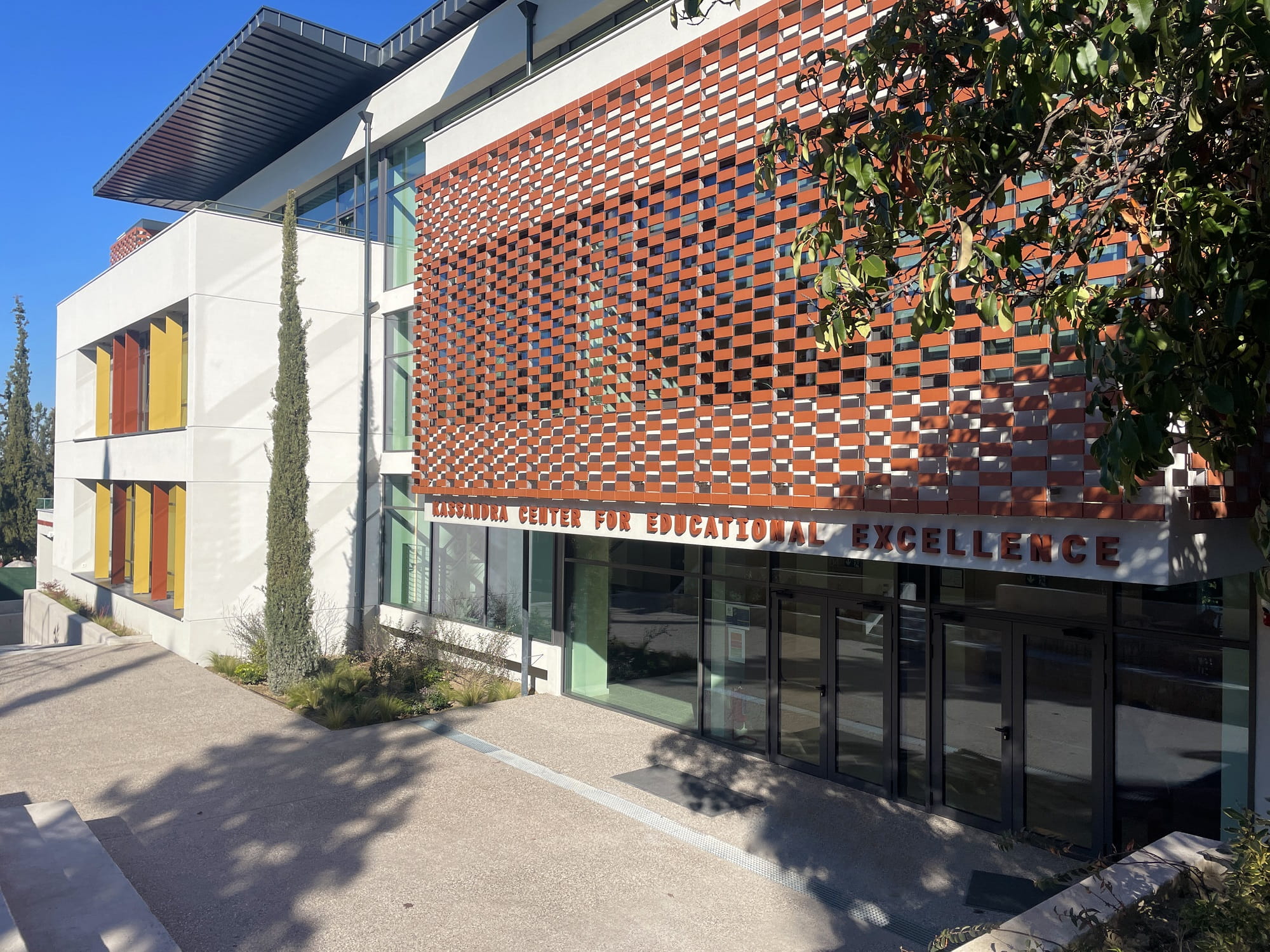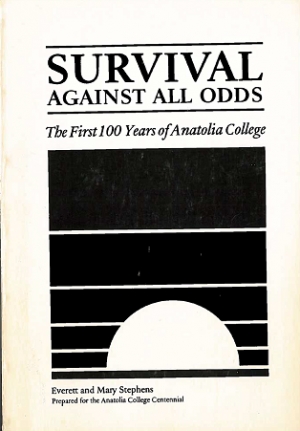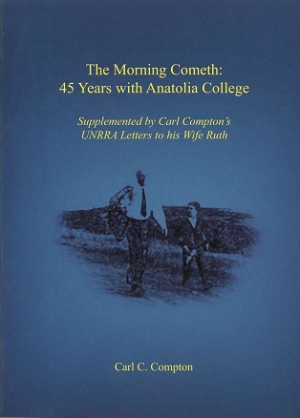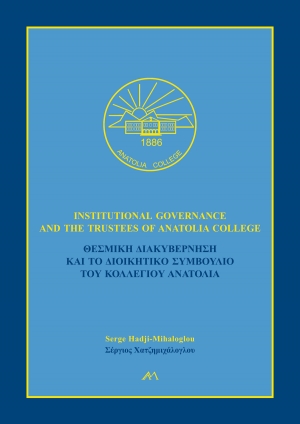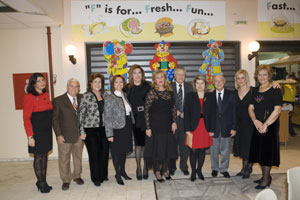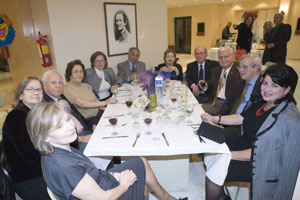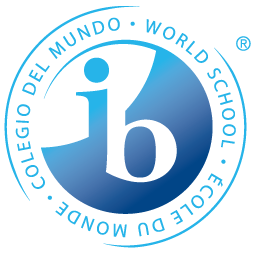by Serge Hadji-Mihaloglou
This cogent case study, analyzes the corporate governance of Anatolia College, a leading educational institution in Greece located in Thessaloniki. More generally, it is an introduction to the structure, composition, culture, and challenges of the Boards of Trustees governing American nonprofit organizations (NPO’s). The focus is on how such boards are set up to best fulfill their oversight and fundraising responsibilities. As Greece reviews governance, financing, and development issues, Anatolia’s time-tested and successful NPO model is noteworthy. Well-run NPO’s couple private initiative, leadership and funding with state enablement in legal and tax regulation. They facilitate developing services for the common good guided by community needs. Serge Hadji-Mihaloglou is a New York corporate lawyer and Anatolia Alumnus and Trustee. Preliminary remarks headed by Thessaloniki Mayor Yiannis Boutaris and Aristotle University Law Professor Anastasia Grammaticaki-Alexiou underscore the contribution of this original work.
Download the book in .pdf
Book presentation on June 1st 2013, at Anatolia College, by Professor Van Coufoudakis, President of the Hellenic Quality Assurance and Accreditation Agency (H.Q.A.), Rector Emeritus at the University of Nicosia, Cyprus, Dean Emeritus College of Arts and Sciences, Indiana University-Purdue University:
I would like to congratulate President Vlachos on his recent appointment to the Presidency of Anatolia College, and to thank Anatolia College for their invitation to present Serge Hadji-Mihaloglou’s book “Institutional Governance and the Trustees of Anatolia College.”
Drawing on his experience as corporate lawyer and as an Anatolia Trustee, the author has presented us with a most informative bilingual volume on the structure, composition, culture and the challenges confronting the Board of Trustees of this American “not for profit” institution.
The timing of the publication of this book could not have been better for at least three reasons:
A) The financial crisis affecting Greece and the troika’s reform demands are forcing a reevaluation of Greek public finance. This, will inevitably, impact Greek higher education.
B) The process of restructuring Greek higher education under the “Plan Athena” offers new opportunities to review traditional administrative practices in Greek public universities. And
C) The newly elected governing councils in public higher education institutions. Their functions, on paper at least, parallel those of a board of Trustees. This new development was politically controversial. It is likely to create additional problems unless apparent jurisdictional conflicts between the councils and the traditional university leadership are resolved soon.
Serge Hadji-Mihaloglou’s book helps dispel many of the myths about private higher education institutions. It also outlines how Anatolia’s Governance system contributed to its success and to its ability to live up to its mission.
The book explains how a 501(c) (3) type institution operates both in the US and abroad. Anatolia was incorporated in the state of Massachusetts in 1894.
As a “not for profit” institution, Anatolia combines public and private sector elements to advance important social and cultural goals. The “not for profit” status does not imply the lack of regulation or accountability, even in the absence of direct state funding. The ultimate penalty for non-compliance with existing standards is the loss of favorable tax status.
Anatolia College faces many regulatory mechanisms originating from both the United States and Greece. These include, but are not limited to, the oversight exercised by the board of trustees and the Board’s Governance Committees; the regulations of the State of Massachusetts and the accreditation standards of the New England Association of Colleges and Universities; the internal revenue service of the us federal government; and Greek government institutions like the Ministry of Finance, the Ministry of Education, the Greek courts, the EU, just to name a few.
The book identifies and discusses the legal, financial, and socio-economic challenges facing a “not for profit” American institution operating in Greece. The limited tax exemption system in Greece, and the impact of the economic crisis on philanthropy has created special challenges for “not for profit” institutions. Nothing in the current Greek tax law compares to the deductibility provisions available to “not for profit” institutions operating in the United States. An appropriate tax framework is vital to the success and survival of a 501 (c) (3) type institution.
The most significant contribution of the book is its analysis of Anatolia’s Institutional Governance structure, a subject not well known or understood in Greece. In addition to its “not for profit” status, Anatolia’s governance structure distinguishes this institution from its Greek counterparts.
The book outlines the attributes and qualifications of the Trustees; the competence and functions of the various Trustee Committees and the well-structured system of checks and balances that keeps both the Board of Trustees and the institution itself operating properly.
This discussion provides unique insights as well as contrasts with Anatolia’s Greek counterparts. Anatolia’s governance model contributes new ideas on how to improve the management of Greek higher education institutions, especially since the introduction of the new governing councils.
I was pleased to read that the Board of Trustees adopted the May 2010 report and recommendations on Anatolia’s Governance and on the challenges facing the institution’s governance structures.
The public forum held a year ago for Anatolia faculty and staff on how Anatolia is governed, offered a new understanding of the governance of this “not for profit” institution, a subject not well understood in Greece.
Reading about Anatolia’s 35member Board of Trustees and the details of its 11 standing committees helped me understand better the culture of governance and the special challenges facing the Anatolia Board of Trustees, including the impact of the economic crisis on philanthropy.
The book explains why a balance is needed in the membership of the Board between American and Greek members, as well as in the background of the Board members.
It is important to note the emphasis given on creating and maintaining a culture of cooperation in the functions of the Board members. This has made possible Anatolia’s adaptation and survival, first in Turkey and later on in Greece.
The book provides an excellent description of the duties and responsibilities of the Trustees; the need for transparency, collegiality and accountability. The issue of Trustee accountability is preeminent and so are the mechanisms of ensuring that accountability, including the role of the Governance Committee. The analysis emphasizes the important role of Committees in facilitating the work of the Board of Trustees.
I started my presentation by congratulating President Vlachos on his recent appointment. The book clearly shows the critical balance that exists in the administration of Anatolia College between the President and the Board of Trustees. Even though the Board has the last word in this shared power governance model, the President, who is Anatolia’s real Chief Executive Officer, is literally at the eye of the storm.
This bilingual book should be read by anyone interested in university administration. To American academic administrators many of the issues under discussion may not be new or surprising. To university administrators in Greece the book brings fresh ideas and approaches to critical issues of university governance.
Despite the legalistic rigidity of the Greek public higher education system, the ongoing financial crisis offers hope for the introduction of changes that will help manage Greek higher education better. There is much that can be learned and shared from the Anatolia experience.
I would like to congratulate and thank Serge Hadji-Mihaloglou for bringing us this book.
Van Coufoudakis
Dean Emeritus College of Arts and Sciences
Indiana University-Purdue University
Book review by Dr. Constantine G. Hadjiyannakis, Lawyer, Former Professor at Pantios University, in Armenopoulos, the Thessaloniki Bar Law Journal, Issue 5, May 2013 (in Greek):
Η βιβλιογραφία για την εταιρική διακυβέρνηση πλουτίστηκε, πρόσφατα, με το δίγλωσσο βιβλίο του κ. Σέργιου Β. Χατζημιχάλογλου υπό τον ελληνικό τίτλο «Θεσμική Διακυβέρνηση και το Διοικητικό Συμβούλιο του Κολλεγίου ΑΝΑΤΟΛΙΑ».
Ο κ. Χατζημιχάλογλου υπήρξε διαπρεπής δικηγόρος στις Η.Π.Α., νομικός σύμβουλος μεγάλων πολυεθνικών εταιριών, με ειδίκευση στις εξαγορές επιχειρήσεων, σε σχέση με τα δικαιώματα βιομηχανικής ιδιοκτησίας και σημάτων. Παράλληλα, είχε μεγάλη συμμετοχή στους αγώνες της ομογένειας, ιδιαίτερα αναμείχθηκε στις ευρύτατες κινητοποιήσεις του ελληνικού lobby, μετά την εισβολή της Τουρκίας στη Μεγαλόνησο, εξαιτίας και της ακαδημαϊκής εξειδίκευσής του στο διεθνές δίκαιο. Μοιράζοντας, μετά από τη λαμπρή επαγγελματική καριέρα του, το χρόνο του μεταξύ Ελλάδας και Η.Π.Α., ασχολήθηκε ενεργά, με το Αμερικανικό Κολλέγιο ΑΝΑΤΟΛΙΑ (εφεξής: «το Κολλέγιο» ή «το ΄Ιδρυμα»), από το οποίο αποφοίτησε στις αρχές της δεκαετίας του 1960, ως μέλος του Διοικητικού Συμβουλίου (εφεξής: Δ.Σ.) του.
Εάν από την ανάγνωση του τίτλου θεωρήσει κανείς ότι το βιβλίο αυτό του συγγραφέα έχει περιορισμένο πρακτικό ενδιαφέρον, εκτιμώ ότι θα διαψευστεί από τη μελέτη του, γιατί αποτελεί μία σημαντική συνεισφορά στα θέματα της εταιρικής διακυβέρνησης, ειδικότερα όσον αφορά τα μη κερδοσκοπικά σωματεία / αστικές εταιρίες / ιδρύματα της Ελλάδας, όπου η σχετική βιβλιογραφία είναι ανύπαρκτη. Πρόκειται για μια αξιοπρόσεκτη συμβολή, που ξεπερνά τα όρια μιας απλής παράθεσης των καταστατικών διατάξεων ενός συγκεκριμένου μη κερδοσκοπικού εκπαιδευτικού Ιδρύματος, με έδρα την Πολιτεία της Μασαχουσέτης των Η.Π.Α.
Εκκινώ από τη συνήθη παρατήρηση ότι, στην πολύπλοκη εποχή μας, των μεγάλων τεχνικών και γενικότερα επιστημονικών κατακτήσεων, το δυσχερέστερο στην καθημερινή ζωή είναι να καταπείσει κανείς τους άλλους για τα προφανή. Ο συγγραφέας εξηγεί ποιες επιλογές σε θέματα θεσμικής διακυβέρνησης μη κερδοσκοπικών σωματείων / αστικών εταιριών / ιδρυμάτων επέτρεψαν στο Κολλέγιο να αναπτυχθεί στο χώρο της παιδείας και να προσφέρει στους μαθητές του και στην κοινωνία της Θεσσαλονίκης ένα νέο πρότυπο εκπαίδευσης / μόρφωσης / συμμετοχής στην κοινωνική ζωή, που όμοιό του δύσκολα συναντάται, ιδιαίτερα εάν λάβει κανείς υπόψη ότι, σήμερα, το Κολλέγιο εκκινεί από παιδικό σταθμό και τερματίζει σε Κέντρο Μεταλυκειακής Εκπαίδευσης (ΚΕΜΕ), που παρέχει ανώτατη εκπαίδευση προπτυχιακού και μεταπτυχιακού επιπέδου.
Οι παρατηρήσεις του συγγραφέα θα μπορούσαν να διακριθούν σε δύο είδη: οι πρώτες αφορούν τα άτομα και το κλίμα, μέσα στο οποίο τα μέλη του Δ.Σ. του Κολλεγίου προσφέρουν τις ανιδιοτελείς υπηρεσίες τους και οι δεύτερες αφορούν το πλαίσιο και τις διαδικασίες μέσα στις οποίες ενεργούν, δρουν. Είναι διαπίστωση της ζωής ότι, χωρίς ανθρώπους αφοσιωμένους στο έργο τους, δύσκολα μπορεί να επιτύχουν ανθρώπινα έργα. Και σε αυτήν, όμως, την περίπτωση, τελικά, η επιτυχία τους εξαρτάται και από το πλαίσιο μέσα στο οποίο κινούνται, ώστε αυτό να τους επιτρέπει να ξεδιπλώνουν τις ικανότητές τους και τα ταλέντα τους, χωρίς φόβο και πάθος.
Πράγματι, όπως προκύπτει από την ανάπτυξη της συγκρότησης του Δ.Σ. του Κολλεγίου, το κύριο χαρακτηριστικό είναι ότι τα μέλη του διαπνέονται από τις ίδιες αρχές, δηλαδή αφοσίωση στην αποστολή τους, επαγγελματικότητα, αυτοπειθαρχία και κοινή πίστη ότι αυτό που προέχει, σε σχέση με το συγκεκριμένο ρόλο τους, είναι η καταβολή συνειδητής προσπάθειας για τη δημιουργία αισθήματος συνοχής.
Ό,τι παραπάνω αναφέρεται ίσως δημιουργεί την αίσθηση του «θεωρητικού» ή του «ανέφικτου», όπως λένε οι Αγγλοσάξονες «is too good to be true». Όμως η περιγραφή των καθηκόντων και των υποχρεώσεων των μελών του Δ.Σ., του τρόπου επιλογής τους, αλλά και της ανανέωσης ή μη της θητείας τους, συνηγορούν στη δημιουργία του κατάλληλου κλίματος μεταξύ των μελών του, ώστε να επικρατούν στην πράξη οι παραπάνω αρχές. Υπάρχουν κανόνες, που προβλέπουν τα απαιτούμενα προσόντα, μοιράζονται οι θέσεις μεταξύ κατοίκων Ελλάδος και Η.Π.Α., μεγάλο μέρος των μελών του είναι απόφοιτοι και επιδιώκεται η ηλικιακή ανανέωση του δυναμικού του, ώστε τα παλαιά μέλη να λειτουργούν ως μέντορες για τα νεότερα.
Δύο σημαντικές διαδικασίες, που δρουν ενισχυτικά για την καλύτερη λειτουργία του Δ.Σ. είναι από τη μια μεριά η συνεχής αξιολόγηση της προσφοράς των μελών του και ο αυστηρός έλεγχος τυχόν σύγκρουσης συμφερόντων μεταξύ αυτών και του Κολλεγίου. Ιδιαίτερο κεφάλαιο αφιερώνεται στην εποπτεία που ασκείται από την Επιτροπή Διακυβέρνησης του Δ.Σ. του Κολλεγίου, στην οποίαν έχει ανατεθεί το βαρύ καθήκον της «φύλαξης των φυλάκων» (quis custodiet custodes?). Έχει καθιερωθεί η αξιολόγηση κάθε μέλους του Δ.Σ., αλλά και αυτού ως σώματος. Λαμβάνονται υπόψη όλοι οι απαραίτητοι παράμετροι, ώστε οι τελικές κρίσεις να έχουν τη μεγαλύτερη δυνατή αντικειμενικότητα.
Στο σημείο αυτό, αξίζει να σημειωθεί η επισήμανση της καθηγήτριας της Νομικής Σχολής του Α.Π.Θ. κ. Αν. Γραμματικάκη – Αλεξίου, η οποία, στις προκαταρκτικές παρατηρήσεις του βιβλίου, ορθά σημειώνει ότι στα ανώτατα εκπαιδευτικά ιδρύματα της χώρας «… κάθε απόπειρα εισαγωγής νέων ή αλλοδαπών προτύπων, που έχουν λειτουργήσει κι έχουν αποδώσει σε άλλα ιδρύματα, αντιμετωπίζεται με καχυποψία έως και εχθρότητα»!
Όπως μας εξηγεί ο συγγραφέας, οι ίδιες απαιτητικές δεσμεύσεις ισχύουν και για την επιλογή των διοικητικών στελεχών του ιδρύματος, κυρίως του «Προέδρου του Ανατόλια», που είναι, ex officio, μέλος του Δ.Σ., το κύριο εκτελεστικό όργανο, που εφαρμόζει την πολιτική του σχολείου, όπως αυτή καθορίζεται από το Δ.Σ. Η συνεχής αμφίδρομη ανταλλαγή πληροφοριών και ενημέρωσης μεταξύ των οργάνων του Κολλεγίου, που δρουν στην καθημερινή πράξη, με τον Πρόεδρο και τα μέλη του Δ.Σ., αποτελεί αναγκαία συνθήκη για την «από κοινού διοίκηση» του Ιδρύματος, στην οποία λόγο σημαντικό και προσφορά μεγάλης σημασίας έχουν οι δάσκαλοι και καθηγητές του, αλλά και οι μαθητές και οι γονείς τους.
Ενδιαφέρουσα από κάθε πλευρά είναι η παράθεση της νομικής δομής του ιδρύματος, ως μη κερδοσκοπικού νομικού προσώπου με έδρα τις Η.Π.Α. Επιβεβαιώνεται στην πράξη η σημασία που δίδεται στη χώρα αυτή στους μη κερδοσκοπικούς οργανισμούς και οι κανόνες που ισχύουν για να επιτρέψουν την άνετη χρηματοδότησή τους από δωρεές (π.χ. φοροαπαλλαγές), μια πρακτική που έχει δυσφημιστεί στη χώρα μας από τις γνωστές υπερβολές όλων μας. Ο συγγραφέας, ορθά, κατά τη γνώμη μας, υποστηρίζει ότι οι φοροαπαλλαγές εξυπηρετούν το κράτος, γιατί περιορίζεται η δραστηριότητά του, που μετακυλίεται στις εθελοντικές κοινωνικές ομάδες και ενδυναμώνεται η διάθεση των τελευταίων για ανάληψη κοινωνικών πρωτοβουλιών.
Αποτελεί κοινό τόπο ότι, παρά την τελευταία νομοθετική παρέμβαση (άρθρο 270 ν. 4072/2012), που εξομοιώνει τις αστικές μη κερδοσκοπικές εταιρίες, που αποκτούν νομική προσωπικότητα με τις ομόρρυθμες εταιρίες, αυξάνοντας σημαντικά τις υποχρεώσεις των εταίρων τους, παρατηρείται αύξηση του αριθμού τους, ενόψει της επιλογής του τύπου αυτού ως του πλέον καταλλήλου για την υποβολή αιτημάτων συμμετοχής σε προγράμματα χρηματοδοτούμενα, εν μέρει ή εν όλω, από την Ευρωπαϊκή Ένωση. Όπως ορθότατα παρατηρεί ο συμμαθητής του συγγραφέα, αλλά και του υπογράφοντα, Γιάννης Μπουτάρης, Δήμαρχος Θεσσαλονίκης, στις εισαγωγικές παρατηρήσεις του βιβλίου, οι παραπάνω φορείς και οργανώσεις μη κερδοσκοπικού χαρακτήρα και αυτοί που διαμορφώνουν την αποστολή και τις επιδόσεις τους πρέπει να κοιταχθούν καλά στον καθρέφτη και να καταλάβουν τι ακριβώς κάνουν και πώς το κάνουν, εάν θέλουμε η χώρα μας να ανακάμψει και να επανακτήσει την προοπτική της. Και συμπληρώνει ότι αυτό θα καταστεί πραγματικότητα, εφόσον «…έχοντας αποκτήσει αυτό το γνώθι σαυτόν, … αναλάβουν το επίπονο έργο της αναδιαμόρφωσης της αποστολής τους, της ανανέωσης της ηγεσίας τους, της αναβάθμισης της λειτουργίας τους». Στην εξυπηρέτηση αυτού του στόχου κινείται το κρινόμενο βιβλίο του κ. Σέργιου Β. Χατζημιχάλογλου, που, παρουσιάζοντας αναλυτικά τη θεσμική διακυβέρνηση του Αμερικανικού Κολλεγίου ΑΝΑΤΟΛΙΑ, μπορεί να χρησιμοποιηθεί, ως συγκριτική αξιολόγηση (bench marking), από τα ομόλογα ελληνικά μη κερδοσκοπικά σωματεία / αστικές εταιρίες / ιδρύματα.
Κωνσταντίνος Γ. Χατζηγιαννάκης
Δικηγόρος Θεσσαλονίκης
τ. Καθηγητής Παντείου
Read the Express newspaper article here.
More

